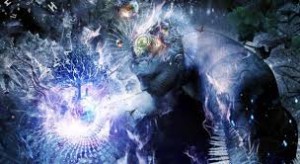The main myth through which we interpret our experience, is the one that tells us that all perception and knowledge must come to us through the physical senses.
This is the myth of the exteriorized consciousness — a consciousness that we are told is open-ended only so far as objective reality is concerned. It seems to be closed “at the other end,” which in those terms would represent our birth.
The consciousness of that myth can indeed have no origin, for the myth precludes anything but a physically-oriented and physically-mechanized consciousness. Not only could that consciousness have no existence before of after death, but obviously it could have no access to knowledge that was not physically acquired. It is this myth that hampers our understanding most of all, and that closes us off from the greater nature of those events with which we are most intimately concerned. That myth also makes our own involvement with mass events sometimes appear incomprehensible.
There seems to be no reason for many of them, simply because the intricate inner communication systems of consciousness go utterly unrecognized, generally speaking.
I am speaking largely to a Western audience, and so here I am using terms for a particular reason, to explain concepts in a way that will be understood. The inner ego is perfect as a term to suit my purposes. “Unconscious” is indeed conscious — and by conscious I mean that its reasoning is not irrational. Its methods are not chaotic, and its characteristics are not only equal to those of the known ego, but indeed are more resilient and knowledgeable.
Conscious-mind-1 and 2 obviously represent not only different kinds of reality in normal terms, but two different kind of consciousness. To make this discussion as simple as possible for now, think of these two frameworks or states of consciousness as being connected by “undifferentiated areas” in which sleep, dreaming, and certain trance states have their activity. Those undifferentiated areas are involved in the constant translation of one kind of consciousness into the other, and with energy transferences. We constantly process those data that come to us in our private life, and that information includes bulletins from all over the world, through our news broadcasts and so forth.
The inner ego has access, to a much vaster amount of knowledge. It is aware not only of its own private position, as we are of ours, but it is also familiar with the mass events of its reality. It is intimately involved in the creation of our own private experience.
The inner ego reasons, but its reasoning is not restricted to the cause-and-effect limitations that we apply to the reasoning process. The action of the inner ego within the wider sphere of Conscious-mind-2 explains many events and seeming coincidences that otherwise seem to make no sense within our world. Many realities within Conscious-mind-2 cannot suitably be explained as facts to us in Conscious-mind-1, simply because they involve psychological thickness that cannot be translated into facts as we think of them. These often appear in the symbolic language of the arts instead, and many of our dreams are translations in which the events of Conscious-mind-2 appear in symbolic form.
On any given day the events of our private lives fit within the larger patterns of world events, in which they have their context. On any given night the intimate events of our dream lives also exist in the greater context of the world’s dreams — in which they have their reality.
The consciousness that we have, as generally described in psychology, is in a strange fashion like the bright shiny surface that responds to sun or rain or temperature, and to its surroundings; but for all of that a psychological fruit that has no pulp or pits, but contains at its heart a vacancy. In those terms we experience only one half of our consciousness: the physically-attuned portion. Fruit trees have roots, but we assign no ground of being to this consciousness.
Jung’s collective unconscious was an attempt to give our world its psychological roots, but Jung could not perceive the clarity, organization, and deeper context in which that collective unconscious has its own existence. Reality as Conscious-mind-2 is organized in a different fashion than it is in the Conscious-mind-1 world, and the processes of reasoning are far quicker. In Conscious-mind-1 the reasoning processes work largely by deduction, and they must constantly check their own results against the seemingly concrete experience of physical events. The reasoning of the inner ego is involved with the creative invention of those experiences. It is involved with events in a context of a different kind, for its deals intimately with probabilities.
[Each of ] us, with our beliefs and intents, tell the inner ego which of an infinite number of probable events we want to encounter. In dream state events from both frameworks are processed. The dream state involves not only a state of consciousness that exists between the two frameworks of reality, but also involves, in those terms, a connecting reality of its own. I would like to emphasize that to one degree or another all species of plant and animal life “dream.” The same applies to the “psychological activity” of atoms and molecules, and any “particle.”
There are intensities of behavior, then, in which the activity, the inside activity, of any being or particle is directed toward [the] physical force [that is] involved in the cooperative venture that causes our reality. There are variances, however, when such activity instead into interior nature of reality. We have an inner system of communication, then, in which the cells of all living things are connected. In those terms there is a continuum of consciousness.
To really understand our own connection with the events we encounter privately, and in relationship to others, we must first become acquainted with that medium in which events themselves are formed.
What part, for example, does chance play in our life? Is it chance if we arrive too late to board a plane, for example — to find later that the plane crashed? Perhaps our late arrival was caused by “a chance meeting” with a friend at the last moment, or by a misplaced ticket, or by a traffic jam that seemingly had nothing to do with us at all.
We may have become a part of the drama of a natural disaster, or avoided it as a result of other seemingly chance occurrences. What appears to us as chance or coincidence, however, is actually the result of the amazing organizations and communications active in the psychological reality of Conscious-mind-2. Again, we form our reality — but how? And how do private existences touch each other, resulting in world events?
This will not be a dry, intellectual exploration, because the intent itself will begin to trigger within our lives the emergence of hints and clues as to our own immersion in Conscious-mind-2’s creativity.









